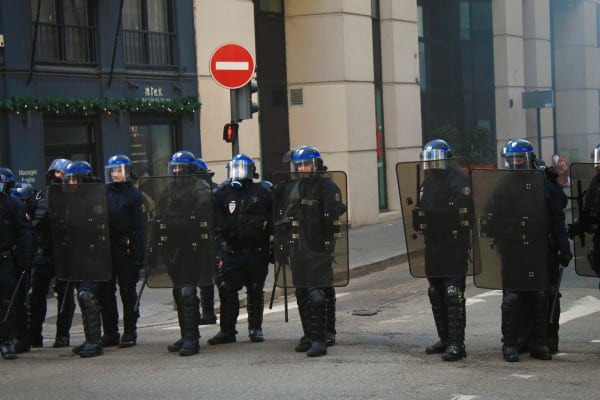This page contains affiliate links. This means if you a follow a link and make a purchase, at no additional cost to you, Humanitarian Careers will receive a commission. Thank you for supporting the site.
The United Nations is the most powerful international organisation in the world. Founded after World War Two, the UN aims to maintain global peace and security though international cooperation and dialogue.
Although the UN is seen as a bed-rock of the post-War world order, it is regularly criticised for its failings. There are some who say the world would be better without the UN. Would it be? What would actually happen if the United Nations collapsed, or was disbanded?
The collapse of the United Nations would be a huge shock to the international system.
If the UN collapsed, all its projects, peacekeeping missions and agencies would stop operating. It is possible that international laws passed by the UN would no longer be in-place. The collapse of the UN would also remove a key arena for global dialogue and could be followed by a potential re-alignment of the world order.
Now we have an overview of what might happen if the United Nations collapsed, let’s go over in detail each possible scenario.
The first thing that would happen if the UN collapsed is that funding to the UN’s international programmes would stop. The UN funds a huge range of projects around the world, from refugee camps to scientific research, from regulating global air travel to preserving cultural sights. If the UN collapsed, these projects would stop immediately, unless another international body or individual nations were able to step-in and continue them.
Another thing that would happen if the United Nations collapsed or disbanded would be the immediate end of the UN’s peacekeeping missions around the world. The United Nations currently has 12 peacekeeping missions around the world. These peacekeeping operations can be vital in ensuring peace in many areas. If the UN collapsed, it’s conceivable many conflicts could reignite.
If the United Nations collapsed or disbanded one thing that would happen is that there would be a vacuum in international law. The UN has created many laws that govern international relations. If the UN didn’t exist, what would happen to these laws? There are a huge range of consequences and possible outcomes that could occur if all of the sudden there was no international law. It is conceivable that without the organisation that created these laws, they may no longer be in-place.
One consequence of the UN collapsing would be that there would no longer be a forum for dialogue between nations. The United Nations was designed so that countries could work together and solve disputes without resorting to conflict. Although the UN has a mixed record on achieving this, if it collapsed or disbanded there would likely be no global forum for solving disagreements between countries or place where nations could combine efforts on major global issues.
If the UN was disbanded or collapsed, another possible thing that could happen is a realignment of the current global order. The United Nations was created after World War Two and provides significant global power to the victorious nations. This is especially the case with the Security Council. If the United Nations collapsed, this world order would be thrown open allowing other nations to pursue international agendas without the possible constraints of the UN.
In actual fact, if the United Nations were to collapse or be disbanded, it is likely that it would be replaced with another inter-governmental organisation. This could play-out either of two ways. Firstly, the UN could be replaced with another global international body designed to address the failings in the current UN. This is very much what happened when the current United Nations replaced the League of Nations.
The second scenario that could happen if the UN were to be replaced would be for it to fracture and rival inter-governmental organisations be created. This could happen if nations banded together with allies to form competing global bodies based on allegiances, geography or political alignments.
How The United Nations Might Collapse
Realistically, there are two main ways that the United Nations could collapse. These can be divided into ‘internal’ and ‘external’ causes.
An internal collapse of the UN would mean the organisation was destroyed by factors within itself. There are several ways this could happen, including financial collapse, a major internal scandal or the UN deciding voluntarily to disband itself.
The second way the UN could collapse would be from external factors. This would include national governments collectively deciding to dispend the UN, some major, or many minor countries deciding to leave or countries withdrawing funding.
With both types of scenarios established for how the UN could collapse, let’s explore how they could happen.
A financial collapse of the UN could occur if the UN mis-spent their budget. Poor accounting or lack of financial controls could mean the UN has a gap in its budget. If this was large enough, and nations were unable or unwilling to assist financially, the UN could collapse.
A major internal scandal could result in the UN being disbanded. Although it would be hard to think of an issue so huge that the UN collapses, if massive and extensive corruption, deliberate malpractice or political interfering on a huge scale was uncovered, it is conceivable the UN could be disbanded.
A final way the UN could internally collapse or disband would be if it voluntarily ended its own tenure. This is also hard to imagine happening. However, the United Nations could conceivably decide that it was no longer fit-for-purpose and disband to be replaced with another inter-governmental organisation.
A possible external factor that could result in the UN’s collapse is if countries agree to disband it. If all nations, or more likely some major nations, agreed to dissolve the UN, it is possible the organisation could cease to exist.
As well as nations agreeing to disband the United Nations, another way it could collapse is if some major nations leave. If some global powers formed a block and decided to leave the UN, perhaps because of political disagreements with other nations, then it could be possible for the UN to collapse.
A final way that the United Nations could disband or collapse would be if nations withdrew funding from it. The UN is funded by payments from member states. If some major countries that contribute a significant percentage of the UN’s budget decided to withdraw funding it could be possible for the UN to collapse. This would only happen if other countries were unwilling or unable to meet the budget short-fall.
United Nations Online Courses
If you want to learn more about the United Nations, and why it won’t collapse, we highly recommend the online course Global Diplomacy: The United Nations in the World offered by SOAS in London. We think it provides one of the best overviews of the UN and its role in the current global order. SOAS is also one of the top universities in the world for international relations and courses related to the UN.
The Sustainable Development Goals (SDG) underpin all of the UN’s work. In order to fully understand the United Nations, and why its collapse is almost impossible, you need a basic understanding of the SDG. We think the online short course The Sustainable Development Goals – A Global, Transdisciplinary Vision For The Future offered by the University of Copenhagen is one of the best introductions to the SDG.
The University of Leiden in the Netherlands offers an online short course on The Changing Global Order. It includes a specific look at how shifting international power dynamics are affecting the current global system and the United Nations. For those wanting to understand the challenges the UN faces, this online course is a must.
Will The United Nations Collapse or Disband?
There are many ways that the UN might cease to exist. However, in actual fact, the likelihood of any of these scenarios happening is very small. There are several reasons why the United Nations is unlikely to collapse, be disbanded or be replaced with another organisation.
The first reason it is unlikely the United Nations would collapse is that it has already replaced an organisation that failed and was disbanded. The pre-curser to the UN was the League of Nations, which was established after World War One and was the first inter-governmental organisation. However, after many failings, the League of Nations was disbanded in 1946 and replaced with the United Nations. As a result, the UN has built into it many aspects to prevent the failings that occurred with the League of Nations happening again. This makes it much less likely to fail or collapse.
Another reason why the United Nations is unlikely to collapse is that, although there are many legitimate criticisms of the UN, any organisation that were to replace it would unlikely be more successful. This is because any global forum of nations requires a degree of flexibility and pragmatism in order to incorporate all countries. Although this means the UN’s power to affect change is limited, a more controlling inter-governmental organisation would see nations leaving when decisions went against them.
A third reason why it is not projected that the UN will collapse of disband is because it currently supports the global order. All major nations, especially those included in the Security Council, have a vested interest in retaining the United Nations as it helps them maintain power. Although some large nations, and many smaller ones, do not wield as much power within the UN, it is unlikely the major global powers would let the UN collapse, as it helps maintain their position in the current world order.
Could The UN Fail Like the League of Nations?
The League of Nations was established following World War One as an international forum for nations to settle disputes. It was the first inter-governmental organisations and it’s stated aim was to maintain global peace.
Throughout the 1920s and 30s, the League of Nations failed in its objective and was disbanded in 1946 to be replaced by the United Nations.
Historians generally agree the League of Nations failed for five main reasons. These are:
- It failed to encompass all countries, with major powers such as the United States not joining. Many countries also left the League of Nations or only joined for a short-time.
- Countries put their own geo-political objectives ahead of the League of Nations requirement for collective security.
- The League of Nations did not have its own army, and so relied on member states to use military force. Many were not willing to as their populations did not support another war.
- Disarmament was a major aim of the League of Nations, meaning countries were encouraged to reduce military spending. This meant intervening militarily against countries that went against the League was made more difficult.
- The League had no power to stop countries taking aggressive action. When countries such as Germany or Japan began attacking their neighbours, the League was powerless to stop them.
Let’s take each one and see if the modern United Nations could fail for the same reasons?
The United Nations, unlike the League of Nations, includes almost every country in the world. This was a deliberate aim of the UN as countries simply left the League of Nations when decisions went against them. All major global powers also joined the UN, unlike the League of Nations, which lacked the commitment of many important nations at the time. As a result, it is unlikely the modern UN would fail like the League of Nations did due to lack of participation by Let’s take each one and see if the modern United Nations could fail for the same reasons?
The UN, unlike the League of Nations, includes almost every country in the world. This was a deliberate aim of the UN as countries simply left the League of Nations when decisions went against them. All major countries also joined the UN, unlike the league of nations, which lacked the commitment of many important world powers at the time. As a result, it is unlikely the modern UN would fail like the League of Nations did due to lack of participation by major nations.
Today, many countries still put their own geo-political objectives ahead of any UN requirements. This is a failing of the United Nations. However, unlike the League of Nations, the UN is not designed to achieve global peace, but as a forum for nations to solve disputes and for international laws to be created. This means the UN is unlikely to be disbanded like the League of Nations.
Like the League of Nations, the UN does not have its own army. However, it does use the armies of member states as part of its peacekeeping operations. Although UN peacekeepers are not peace-enforcers, and maintain peace agreements rather than fight to create them, the role of the UN peacekeepers in a significant improvement on the League of Nations. This is another reason the UN is unlikely to be disbanded like the League of Nations.
Unlike the League of Nations, the United Nations does not push for global disbarment. As a result, nations are more able to build-up armed forces which can act as a deterrence against aggression. This is another reason why the UN is unlikely to be disbanded like the League of Nations was.
The League of Nations had no power to stop counties taking aggressive action, and this is the same for the United Nations. However, the UN Security Council, when in agreement, can better control smaller nations when they use military force. The UN fails when the Security Council members either cannot agree on resolutions against countries, or are themselves aggressors. Although this limits the power of the UN, it is unlikely to be seen as reason for its complete failure.
If you want to learn more about the United Nations, and why it won’t collapse, explore our list of the top UN online courses here.




